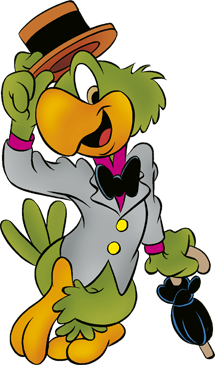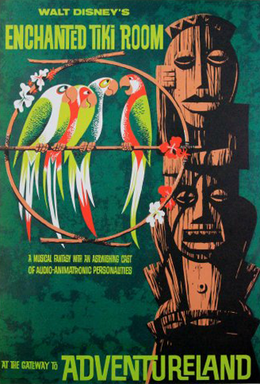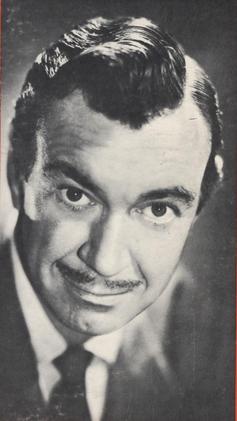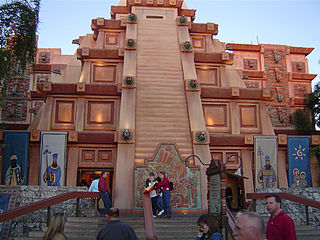Related Research Articles

José "Zé" Carioca is a cartoon anthropomorphic parrot created by the Brazilian cartoonist José Carlos de Brito and shown to Walt Disney on his trip to Rio de Janeiro in 1941. The Walt Disney Company then incorporated the idea, being introduced in the 1942 film Saludos Amigos as a friend of Donald Duck, described by Time as "a dapper Brazilian parrot, who is as superior to Donald Duck as the Duck was to Mickey Mouse." He speaks Portuguese. He returned in the 1944 film The Three Caballeros along with Donald and a Mexican rooster named Panchito Pistoles. José is from Rio de Janeiro, Brazil.

Saludos Amigos is a 1942 American live-action/animated propaganda anthology film produced by Walt Disney and released by RKO Radio Pictures. Set in Latin America, it is made up of four different segments; Donald Duck stars in two of them and Goofy stars in one. It also features the first appearance of José Carioca, the malandro Brazilian parrot. Saludos Amigos premiered in Rio de Janeiro on August 24, 1942. It was released in the United States on February 6, 1943.

The Three Caballeros is a 1944 American live-action and animated musical propaganda anthology film produced by Walt Disney and released by RKO Radio Pictures. The film premiered in Mexico City on December 21, 1944. It was released in the United States on February 3, 1945 and in the United Kingdom in March 1945. It marks the tenth anniversary of Donald Duck and plots an adventure through parts of Latin America, combining live-action and animation. This is the second of the six package films released by Walt Disney Productions in the 1940s, following Saludos Amigos (1942). It is also notable for being one of the first feature-length films to incorporate traditional animation with live-action actors.

Walt Disney's Enchanted Tiki Room is an attraction located in Disneyland at the Disneyland Resort and in Magic Kingdom at Walt Disney World, and previously in Tokyo Disneyland at Tokyo Disney Resort. First opened on June 23, 1963 at the Disneyland Resort, the attraction is a pseudo-Polynesian musical Audio-Animatronic show drawing from American tiki culture.

Thurl Arthur Ravenscroft was an American actor and bass singer. He was well known as one of the booming voices behind Kellogg's Frosted Flakes animated spokesman Tony the Tiger for more than five decades. He was also the uncredited vocalist for the song "You're a Mean One, Mr. Grinch" from the classic Christmas television special Dr. Seuss' How the Grinch Stole Christmas!

Fortunio Bonanova, pseudonym of Josep Lluís Moll, was a Spanish baritone singer and a film, theater, and television actor. He occasionally worked as a producer and director.

Hans Georg Conried Jr. was an American actor and comedian. He was known for providing the voices of George Darling and Captain Hook in Walt Disney's Peter Pan (1953), Snidely Whiplash in Jay Ward's Dudley Do-Right cartoons, Professor Waldo P. Wigglesworth in Ward's Hoppity Hooper cartoons, was host of Ward's live-action "Fractured Flickers" show and Professor Kropotkin on the radio and film versions of My Friend Irma. He also appeared as Uncle Tonoose on Danny Thomas' sitcom Make Room for Daddy, twice on I Love Lucy, and as the Mad Hatter along with Daws Butler, Dolores Starr, Stanley Adams, Francis Condie Baxter and Cheryl Callaway in The Alphabet Conspiracy (1959).

Rex Elvie Allen Sr., known as "the Arizona Cowboy", was an American film and television actor, singer and songwriter; he was also the narrator of many Disney nature and Western productions. For his contributions to the film industry, Allen received a motion pictures star on the Hollywood Walk of Fame in 1975, located at 6821 Hollywood Boulevard.

Panchito Pistoles is a cartoon anthropomorphic rooster created by Fred Moore. He first appeared in the 1944 Disney film The Three Caballeros with his friends Donald Duck and José Carioca. He later appeared in several Disney comics, including a year-long run in the Silly Symphony Sunday comic strip (1944–1945) as well as Don Rosa's comic book stories The Three Caballeros Ride Again (2000) and The Magnificent Seven Caballeros (2005). He speaks Spanish with a Mexican accent.

El Rio del Tiempo was a dark ride housed within the pyramid-shaped Mexico pavilion, in EPCOT Center at Walt Disney World Resort in Lake Buena Vista, Florida. The ride carried passengers on a slow boat ride through various scenes from Mexico's history. The scenes were filled with doll-sized Audio-Animatronic figures clad in authentic folk clothing, singing, dancing and playing music.

Mickey Mouse Disco is an album released by Disneyland Records in 1979. A late entry in the genre of disco, Mickey Mouse Disco included disco versions of Disney songs and Disney-fied versions of disco hits. The album was re-released on CD in 1995, and later as a download. On April 13, 2019, in honor of the album's 40th anniversary, the original LP was reissued for the annual Record Store Day.
Joaquin Garay III is an American former child actor. He is best known for playing the role of Paco in Herbie Goes Bananas.

The Mickey Mouse Revue was an indoor audio-animatronic stage show at the Magic Kingdom and Tokyo Disneyland theme parks. It was one of the three original opening day attractions in Magic Kingdom's Fantasyland in 1971. After closing at Magic Kingdom in 1980, it was moved to Tokyo Disneyland for that park's opening in 1983 where it remained for 26 years before closing permanently in 2009.

William Jesse Shirley was an American actor and tenor/lyric baritone singer who later became a Broadway theatre producer. He is perhaps best known as the speaking and singing voice of Prince Phillip in Walt Disney's 1959 animated classic Sleeping Beauty and for dubbing Jeremy Brett's singing voice in the 1964 film version of My Fair Lady.

"The Three Caballeros Ride Again" is a 2000 Donald Duck comic by Don Rosa.
"The Magnificent Seven Caballeros" is a 2005 Disney comic written and drawn by Don Rosa. The story was first published in the Danish Anders And & Co. #2005-03; the first American publication was in Walt Disney's Comics and Stories #663, in December 2005.

Once Upon a Mouse is a 1981 American theatrical featurette directed by Jerry Kramer and Gary Rocklen of Kramer/Rocklen Studios, produced in association with Walt Disney Productions. It was released on July 10, 1981 on a double bill with The Fox and the Hound.

Legend of the Three Caballeros is a 2018 animated television series based on the 1944 animated Disney film The Three Caballeros, but depicted as a spin-off of the 2017 DuckTales reboot. As with the original film, the series features the characters Donald Duck, José Carioca, and Panchito Pistoles.
Silly Symphony is a weekly Disney comic strip that debuted on January 10, 1932, as a topper for the Mickey Mouse strip's Sunday page. The strip featured adaptations of Walt Disney's popular short film series, Silly Symphony, which released 75 cartoons from 1929 to 1939, as well as other cartoons and animated films. The comic strip outlived its parent series by six years, ending on October 7, 1945.
Events in 1911 in animation.
References
- ↑ "Joaquin Garay". The Museum of the City of San Francisco. Retrieved 16 February 2020.
- 1 2 Kaufman, J.B. (2009). South of the Border With Disney: Walt Disney and the Good Neighbor Program, 1941-1948. Disney Editions. pp. 222–223. ISBN 978-1423111931.
- ↑ "AntonioGenna.net presenta: IL MONDO DEI DOPPIATORI - ZONA CINEMA: "I tre Caballeros"".
- 1 2 Hischak, Thomas S. (2011). Disney Voice Actors: A Biographical Dictionary. McFarland & Company. ISBN 978-0786462711.
- ↑ "Joaquin Garay". imdb.com. Retrieved 16 November 2021.
- ↑ Smith, Dave (1998). Disney A to Z: The Official Encyclopedia (2nd ed.). Disney Editions. ISBN 9780786863914 . Retrieved 16 February 2020.